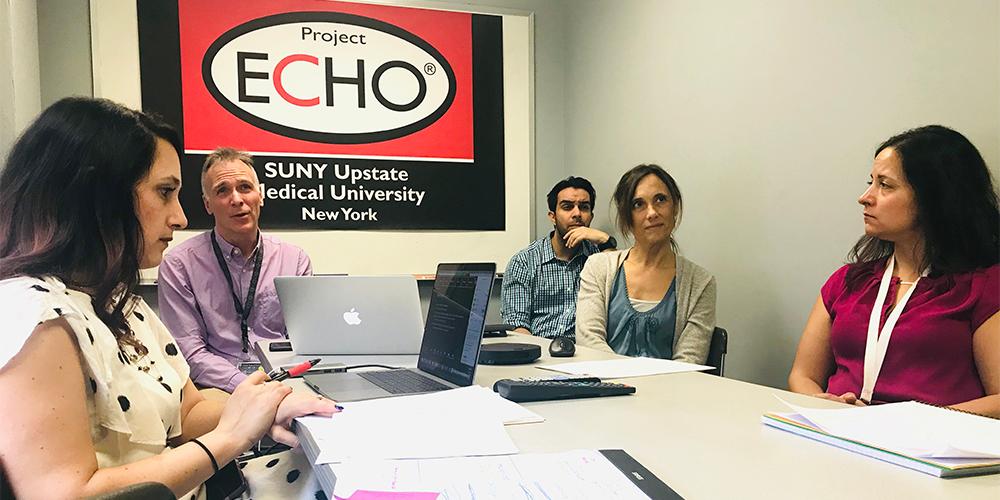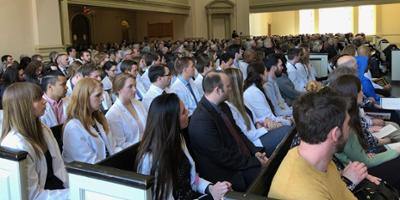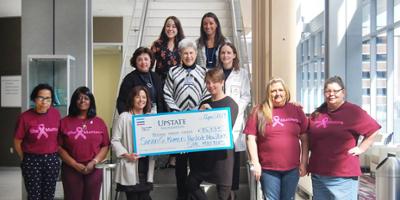Upstate beams toxicologists to doctors across the state to address opioid epidemic, emerging drugs of abuse
Discussions on the latest drug craze, unexpected poisonings and the opioid epidemic will be available to physicians, emergency medical services personnel and other health care workers across the state as part of a new program offered by Upstate Medical University.
Upstate’s most recent offering in its Project ECHO series will make toxicologists from the Upstate Poison Center available monthly to answer questions and discuss poisonings and drug cases that might be showing up in doctors’ offices and emergency rooms across Upstate New York.
Project ECHO uses teleconferencing to beam Upstate toxicologists to computers of participating practitioners.
“Project ECHO eliminates our campus boundaries and brings our medical experts to where practitioners see their patients, whether just down the road or many miles away,” said Project ECHO Manager Deidre Keefe.
“Thanks to our use of technology, we will be in the offices of practitioners across the state to discuss any baffling medical cases they may have encountered and provide our perspective in treating that case,” said Michael J. Hodgman, MD, medical director of the Upstate New York Poison Center and a member of the Upstate faculty. “We’ll also address the new and emerging trends in drug use and other drug-related issues that might be threats to our communities.”
While Poison Center toxicologists are available whenever needed (they are often consulted by Emergency Department staff and emergency medical services personnel during treatment of suspected poisoning), this approach through Project ECHO can be more focused on education and conversation as opposed to addressing a real-time health crisis.
The first toxicology ECHO session will be held April 23 to address “The opioid epidemic: Managing acutely poisoned patients.”
“Every corner of the state is grappling with some aspect of the opioid epidemic, so this session is very timely,” Hodgman said.
He said Upstate is addressing the epidemic with some novel approaches, such as the creation of a clinic in the Emergency Department that provides drug users with prescriptions for buprenorphine that eases cravings and withdrawal symptoms. The clinic is to help ensure drug users get help while they wait for an appointment with a physician or clinic that can get them in for addiction treatment.
“We have good evidence-based information that will be helpful for others to know so we can broaden the successful support for these patients beyond Syracuse,” Hodgman said.
Other Toxicology ECHO presentations include Acetaminophen Poisoning, May 21; Emerging Drugs of Abuse, June 18; VA_ECMO in acutely poisoned patients, July 16; Management of opioid use disorder in the ED: A focus on buprenorphine, Aug. 20; Ethylene Glycol Ingestion, Sept. 17; Pediatric Toxicology: When One Dose Can Kill, Oct. 15; Carbon Monoxide Poisoning and Hyperbaric Oxygen Therapy, Nov. 19; Cases that Make You Go Hmm, Dec. 17; Trends We Learned in 2019, Jan. 21, 2020; My patient has overdosed and has an advanced directive… now what? Feb. 18. The complete schedule for the Toxicology ECHO sessions can be found here.
Since last year, Upstate began offering ECHO clinics in a variety of areas, including multi-specialty pediatrics (pulmonology, gastroenterology, neurology, endocrinology, environmental health, infectious disease, urology, otolaryngology and hematology), geriatrics and endocrinology.
Participants have ranged from residency programs from Buffalo to New York City and practitioners from 16 nearby counties, include the New York City area.





